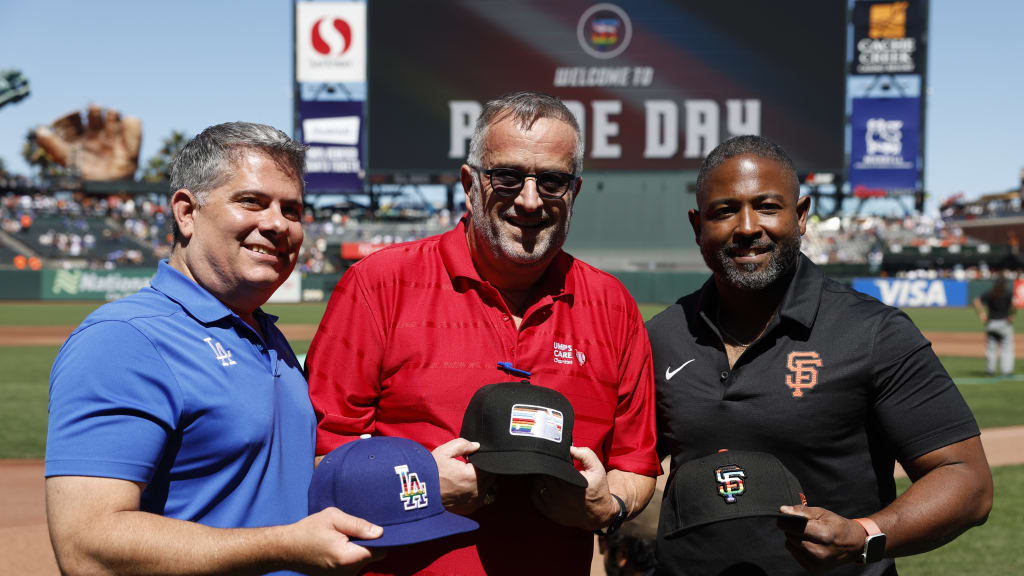
Dale Scott accomplished a lot during his 31-year career as one of Major League Baseball’s most respected umpires, calling three World Series, three All-Star Games, and over 91 postseason games between 1986-2017. He also learned early a fundamental lesson about the gig: If the focus is on you, it usually means something has gone wrong.
For that reason, umpires naturally tend to avoid the spotlight, to not make themselves the story. But Scott, the first openly gay official in any of the United States’ four major male professional sports, knew his would make headlines when he came out publicly. It did, and after experiencing the positive impact that resulted, he’s now telling that story in his own words.
“I wanted to be known not as ‘that gay umpire,’” Scott writes in his new memoir, "but instead, just as an umpire who happens to be gay.”
That qualifies as the overarching theme of Scott’s honest, textured and often hilarious memoir, a deeply personal book that chronicles the double life he lived umpiring at the highest level. Co-authored by Rob Neyer and including a foreword by MLB senior vice president for diversity, equity and inclusion Billy Bean, “The Umpire is Out: Calling the Game and Living As My True Self” isn't a bombshell. It arrived eight years after Scott came out publicly in 2014, after 28 years working in the game without telling colleagues he was gay.
Instead, “The Umpire is Out” attempts to fill in those gaps, focusing on how Scott separated his life in baseball from his life at home in Portland, Ore. It’s also very much a baseball book, full of stories told from the center of some of the sport’s most memorable games.
MLB.com caught up with Scott earlier this Pride Month to discuss his second career as an author. The following interview has been edited for length and clarity.
As you write in the book, you came out as gay in 2014 and have been retired since 2018. What was your motivation to write this book now?
I had no plans to write a book before I retired and after I retired, so many people said: “Oh, you’ve got to write a book. You've got great stories.” The experience I had [coming out] in 2014, the feedback I got was so positive. Also, so many people heard my story and were affected positively from it. Some said, “Thank you for your courage. You gave me a little, also.” Or: “I’m not quite there yet, but I'm another step closer.” I remember a father in Toronto, said, “Congratulations, I'm so proud of you, and I'm hoping my two girls who are eight and 10 grow up in a world where someday this won't even be a story.” In the book I write about [aspiring umpire] Sal [Fernandez], who came out on his high school graduation night, a week after I met him. And he said: “Dale, I’m so happy, and I never would have done this if I hadn't met you.” That's powerful stuff.
Then talking to [contributing author] Rob Neyer, and he said, if I wrote a book he’d be the first person to read it. So I started thinking. I had the stories, but did I have a different story nobody else has? The reaction was so positive but I thought: how many people didn't I hear from? Had it only been the tip of the iceberg? So I thought maybe the story does need to go out there and maybe I'll be the vehicle for it.
What has the reaction been?
It's been great. A lot of it is people messaging me on social media. At a signing in San Francisco, I had a lesbian couple come up, and she was crying. That was so touching. My coming out was pretty easy. I figured out who I was and accepted it. I didn't have any real major issues with my family or friends. But I know that's not always the case. And in the stories, people keep using the word “courage.” It's really humbling, because I was just being honest about my life and my journey. But obviously it's motivated people and been a positive thing. So I'm just really happy about that.
And I'm happy with the feedback on the book. People say it's really funny. I’m a funny guy, in more ways than one.
Some of these stories, I've been telling for literally decades. Trying to put all that on the page was a challenge. People say they hear my voice in it. That's a really great compliment.
Did any of that surprise you?
I’m surprised I haven’t gotten that random hateful email. In online comments, there was some stupid stuff when I came out. As far as the book, a couple tweets. But again, it’s been very few so far.
It's really been 99% positive, and I keep waiting for [that to change]. You still see it in the news. People are out there that don't like us. So I'm kind of waiting for some stupid email or something, but I really haven’t gotten it yet.
Your recall in the book is incredible, your stories packed with specific dates and plays going back to the late 1970s. How challenging was that?
A lot of that was research. I had all my ejection reports. I had a lot of documents from the labor dispute in ’99. And RetroStreet just saves you. I didn't want to be inaccurate or write some great, funny story but not have the dates right.
You mentioned your ejection reports. So much of the book is about ejections, arguments, and, for lack of a better word, fights. The chaos umpires encounter on the field. Yet it's told in an upbeat, decidedly not-bitter tone. How did you reconcile that?
I'm an upbeat guy. That's how my personality is and that's how I approached writing it, in that vein. It seems to have come off that way, which is what we wanted.
You were able to accomplish that without pulling punches. Was that difficult?
Between you and me, there are some players I could’ve said a lot more about. I [insulted] Roger Clemens. And that was really being nice. Things have changed a lot with replay and everything. But if I got down and bitter and miserable over being yelled at I would be in the wrong profession.
In your view, how much progress has MLB made on LGBTQ inclusion issues?
The hiring of Billy Bean in 2014 was very forward-thinking. It made the point showing that in professional baseball, everybody’s welcome. I’m shocked no player since then has come out yet.
And they've expanded [Bean]’s role and he's really done a great job to be a resource. The Pride Nights, they’ve finally got 29 of 30 clubs doing those. Some are bigger than others … so, I think we’re getting there.
I think the infrastructure is there for a player to come out. I think the Commissioner's Office has shown they want to be a part of that. But it hasn’t happened yet.
Do you think an active player will ever come out?
I do. When? I have no idea. When I came out, I had the two players that very first Spring Training game say something. The rest of that year, I had one player, one trainer and one base coach say anything. It was all good. That was it. I really believe the vast majority of the players have played with gay guys before, and I think the vast majority of players only care about: Can he hit? Can he throw? Things have changed in society. We're not (quite) there yet. Sometimes it's two steps forward and one step back.
What do you want the book’s impact to be?
I'm hoping somehow my story will touch someone out there that isn't sure of himself, or isn't sure of the world. That they see that you can be your true self, that you can do it. Have faith in yourself, and there's people that will help you. There's people that are going to be by your side and have your back. Maybe that'll give them the courage to take another step. I keep going back to what Sal Fernandez told me: "I may not make it to the big leagues, but because I don’t have the talent. Not because of who I am." That’s gold. That’s what I want.
